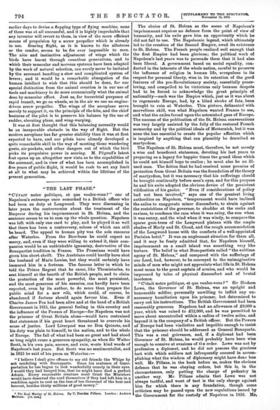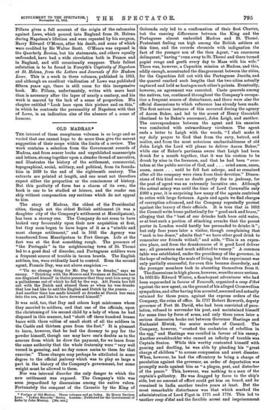"THE LAST PHASE."
"C'ETAIT notre politique, et que voulez-vous ? " one of Napoleon's entourage once remarked to a British officer who bad been on duty at Longwood. They were discussing in
later years the controversies about the treatment of the Emperor during his imprisonment in St. Helena, and the sentence seems to us to sum up the whole question. Napoleon was left with only one card to play, and he played it so well that there has been a controversy, echoes of which can still be heard. The appeal to human pity was the sole resource after Waterloo. From the Bourbons he could expect no mercy, and, even if they were willing to extend it, their com- passion would be an unthinkable ignominy, destructive of the Bonapartist tradition in France. The Prussians would have given him short shrift. The Austrians could hardly have shot the husband of Marie Louise, but they would certainly have immured him in a fortress. The famous letter in which he told the Prince Regent that he came, like Themistocles, to seat himself at the hearth of the British people, and to claim the protection of the most powerful, the most persistent, and the most generous of his enemies, can hardly have been expected, even by its author, to do more than prepare the public mind for a new role, which could, of course, be abandoned if fortune should again favour him. Even if Charles James Fox had been alive and at the head of a British Government in 1815, the general feeling in this country and the influence of the Powers of Europe—for Napoleon was not the prisoner of Great Britain alone—would have restrained that statesman if his great heart threatened to overrule his sense of justice. Lord Liverpool was no Don Quixote, and his duty was plain to himself, to the nation, and to the whole of Europe. The fall of what had been so great and had stood
so long might rouse a generous sympathy, as when Sir Walter Scott, in his own pain, sorrow, and ruin, wrote kind words of Napoleon's last years. But Scott was no sentimentalist, and in 1815 he said of his poem on Waterloo:— "I believe I shall give offence to my old friends the Whigs by not condoling with Buonaparte. Since his sentence of trans- portation he has begun to look wonderfully comely in their eyes. I would they had banged him, that he might have died a perfect Adonis. Every reasonable creature must think the Ministers would have deserved the cord themselves if they had left him in a condition again to cost us the loss of ten thousand of the best and bravest, besides thirty millions of good money."
• The Real Martyr of St. Helena. By T. Dundee Pillans. London Andrew Melrose. Vs. net.]
The choice of St. Helena as the scene of Napoleon's imprisonment requires no defence from the point of view of humanity, and his exile gave him an opportunity which he did not fail to use. The Napoleonic legend, which ultimately led to the creation of the Second Empire, owed its existence to St. Helena. The French people realized well enough that the first Empire had been glorious; the political work of Napoleon's last years was to persuade them that it had also been liberal. A government based on social equality, con- ducted in the interests of the whole nation, careful to preserve the influence of religion in human life, scrupulous in its respect for personal liberty, wise in its retention of the good features of the pre-Revolutionary society, essentially peace- loving, and compelled to be victorious only because despots had to be forced to acknowledge the great principle of nationality—such was the Empire which, just as it was about to regenerate Europe, had, by a blind stroke of fate, been brought to ruin at Waterloo. This picture, delineated with marvellous skill, was what Napoleon wanted France to see, and what the exiles forced upon the astonished gaze of Europe. The success of the publication of the St. Helena conversations was very largely assisted by the folly of the restored French monarchy and by the political ideals of Metternich, but it was none the less essential to create the popular affection which is inspired by anything that can plausibly be described as martyrdom.
The Napoleon of St. Helena must, therefore, be not merely a wise and beneficent statesman, devoting his last years to preparing as a legacy for happier times the grand ideas which he could not himself hope to realize ; he must also be an ill- used man. The fiction that he had received some promise of protection from Great Britain was the foundation of the theory of martyrdom, but it was necessary that his sufferings should be brought continually before men's eyes, and for this purpose he and his suite adopted the obvious device of the persistent vilification of his gaoler. "Even if considerations of policy had not been involved," says one of the greatest living authorities on Napoleon, "temperament would have inclined the exiles to exaggerate minor discomforts, to strain against the restrictions of the governor, to shudder at the rocks and ravines, to condemn the rain when it was rainy, the sun when it was sunny, and the wind when it was windy, to compare the sparse gum-trees of the Longwood plateau with the ample shades of Marly and St. Cloud, and the rough accommodation of the Longwood house with the comforts of a well-appointad Parisian hotel." It was an unpleasant situation for them all, and it may be freely admitted that, for Napoleon himself, imprisonment on a small island was something very like torture. The belief in what Bonapartists called "the sublime agony of St. Helena," and compared with the sufferings of our Lord, bad, however, to be conveyed to the unimaginative minds of men who might not appreciate what life in St. Helena, must mean to the great captain of armies, and who would be impressed by tales of physical discomfort and of brutal insolence.
" C'etait notre politique, et que voulez-eons ? " Sir Hudson Lowe, the Governor of St. Helena, was an upright and honourable soldier, personally unwilling to inflict any un- necessary humiliation upon his prisoner, but determined to carry out his instructions. The British Government had been reasonably generous. Napoleon had an allowance of £8,000 a year, which was raised to £12,000, and he was permitted to move about uncontrolled within a radius of twelve miles, and beyond it in the company of a British officer. But the Powers of Europe had been vindictive and impolitic enough to insist that the prisoner should be addressed as General Bonaparte. This was a real grievance, and, if a diplomat had been Governor of St. Helena, he would probably have been wise enough to connive at evasions of the order. Lowe was not by profession a diplomat, and he did not possess the gracious tact with which soldiers not infrequently succeed in accom- plishing what the wisdom of diplomacy might have done less well. Mr. Pillars, in the book before us, makes the obvious defence that he was obeying orders, but this is, in the circumstances, only putting the charge of pedantry in another way. Mr. Pillans admits that Lowe was not always tactful, and want of tact is the only charge against him for which there is any foundation, though some criticism may be passed upon the new regulations issued by the Government for the custody of Napoleon in 1816. Mr,
Pillans gives a full account of the origin of the calumnies against Lowe, which poured into England from St. Helena during Napoleon's lifetime and were repeated by his surgeon, Barry Edward O'Meara, after his death, and some of which were credited by Sir Walter Scott. O'Meara was exposed in the Quarterly Review, but his statements, and others equally unfounded, have had a wide circulation both in France and in England, and still occasionally reappear. Their fullest refutation is to be found in Forsyth's Captivity of Napoleon at St. Helena, from the Letters and Journals of Sir Hudson Lowe. This is a work in three volumes, published in 1853, and although an excellent vindication of Lowe was published fifteen years ago, there is still room for this inexpensive book. Mr. Pillans, unfortunately, writes with more heat than is necessary after the lapse of nearly a century, and his work is marred by the lack of a sense of proportion. His chapter entitled " Look here upon this picture and on this," in which he contrasts the personality of Napoleon with that of Lowe, is an indication also of the absence of a sense of humour.































































 Previous page
Previous page